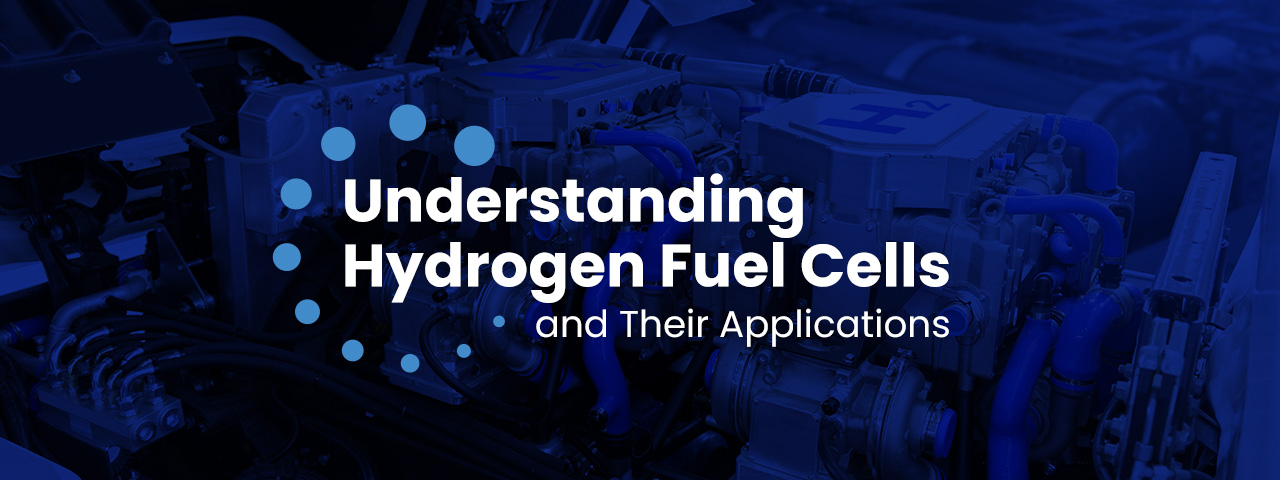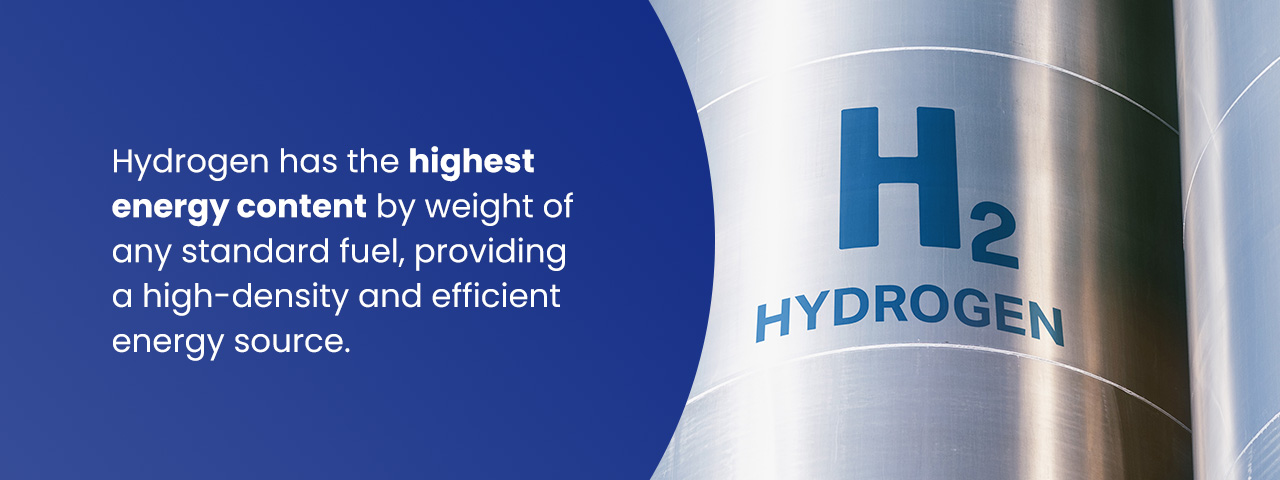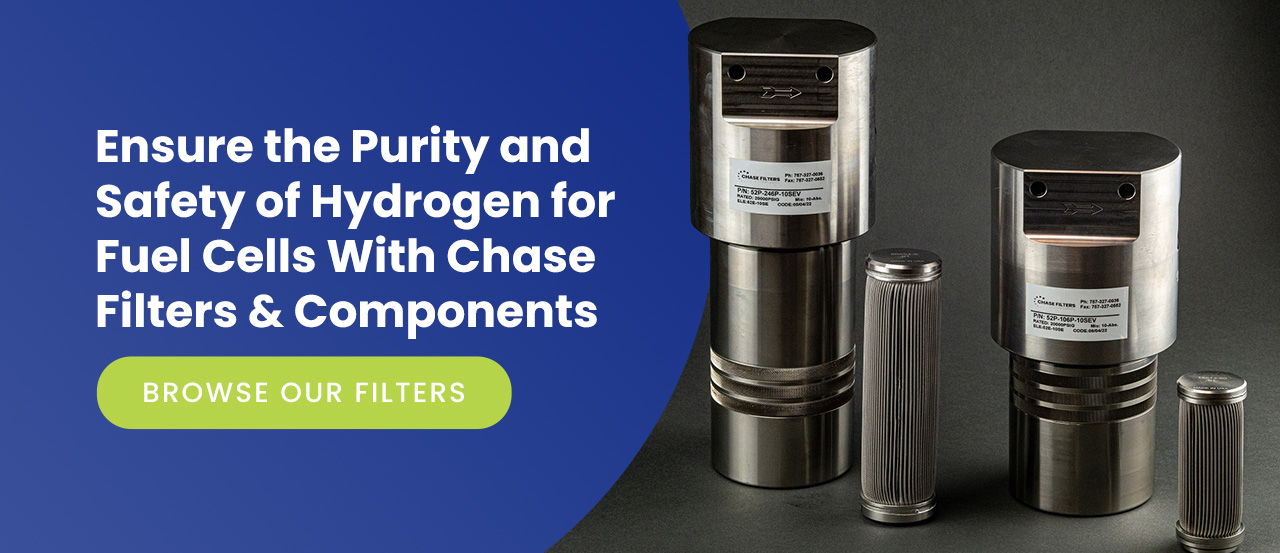September 3, 2025
Understanding Hydrogen Fuel Cells and Their Applications

Industries worldwide are looking for ways to reduce emissions and transform operations with reliable and sustainable alternative energy. Hydrogen fuel cells could be the solution. Hydrogen is abundant in the Earth’s atmosphere and has many actual and potential uses, from rocket fuel to fuel cells.
Using hydrogen fuel cells as an alternative energy source has significant advantages. As of 2020, there were 25,932 hydrogen fuel cell passenger cars and 5,648 buses, and numbers continue to grow. As the technology evolves, more hydrogen fuel cell applications will likely arise.
What Is a Hydrogen Fuel Cell?
A hydrogen fuel cell is an electrochemical device that converts energy into electricity, heat and water. Unlike traditional combustion engines, water, heat and electricity are the only byproducts, eliminating harmful emissions. They can convert the chemical energy in the fuel directly into electrical energy with efficiencies exceeding 60% and have fewer moving parts than traditional engines, allowing for quieter operation. As the demand for sustainable solutions continues to rise, this alternative form of energy will likely gain popularity in various applications.
How Does a Hydrogen Fuel Cell Work?
Hydrogen fuel cells work by converting oxygen and hydrogen gas to electricity, with water and heat as byproducts. The fuel cell requires a positive anode, a negative cathode and an electrolyte membrane. The process includes the following steps:
- Hydrogen cells enter at the anode.
- Oxygen cells enter at the cathode.
- The hydrogen atoms are separated into protons and electrodes.
- The protons with a positive charge move through the electrolyte membrane until they reach the cathode.
- Electrons with a negative charge are pushed through a circuit to create electricity.
- Once the protons and electrons have passed through the circuit or membrane, they meet at the cathode, combining with oxygen and producing heat and water as byproducts.
These fuel cells work like batteries but will not run down or need recharging if they have access to the hydrogen fuel source. They have no moving parts, making them quiet, reliable and easy to transport. Depending on the application, it may be necessary to stack fuel cells to generate the electricity for the intended application.
Protecting your fuel cell system from contaminants ensures its longevity and effectiveness. To refuel a hydrogen fuel cell, the hydrogen must move from the storage tank to the fuel cell through a high-pressure dispensing system, requiring a specific filter to remove moisture, damaging particulates and contaminates. High-pressure hydrogen filters are essential to ensure the hydrogen’s purity and safety during the fueling process.
Hydrogen Fuel Cell Applications
Hydrogen fuel cell applications are growing around the world. They can be used to power devices in many industries, including:
- Transportation: The use of hydrogen fuel cells as a clean energy alternative to combustion engines in vehicles is growing. Fuel cell electric vehicles (FCEVs) use hydrogen fuel cells to generate the energy to power their electric motors. They refuel faster and can drive longer distances than battery-powered electric vehicles. Fuel cells also make their way into public transport, powering electric buses. Hydrogen fuel cell trains are also developing technology for the future.
- Power generation: Fuel cells can generate stationary power in commercial, residential and industrial settings. They also make excellent portable power options for electronic devices like laptops, tablets and smartphones.
- Warehouse logistics: Companies with extensive warehousing and distribution setups can use hydrogen fuel cells to power their vehicles and equipment, such as trucks, forklifts and pallet jacks. The shift to hydrogen fuel cells increases productivity and improves air quality for indoor workers.
- Military and defense: The military and other industries are meeting unmanned aerial vehicle (UAV) battery challenges like power and range with hydrogen fuel cells. Portable and reliable energy is essential in challenging, rugged environments.
- Marine and Navy: Hydrogen fuel cells offer an alternative to nuclear power in submarines, and some boats use hydrogen fuel cell technology.
- Industrial: Industrial applications require reliable, environmentally friendly power that hydrogen fuel cells can provide. They provide the uninterrupted operation of vital infrastructure.
- Home and leisure: Hydrogen fuel cells allow homeowners to operate independently of the power grid. Portable fuel cell generators can make excellent additions to motor homes, boats or cabins.
The Benefits of Using Hydrogen Fuel Cells
Hydrogen fuel cell technology offers significant benefits throughout the applications mentioned above, including:
Sustainability
Hydrogen is an abundant and renewable energy source that meets zero-carbon strategic goals. Fuel cells have minimal environmental impact during operation. Unlike other alternative energy sources, hydrogen generation doesn’t require large areas of land to produce and does not generate greenhouse gas emissions, meaning they do not have a carbon footprint during use.
Efficiency
Energy efficiency is a principal concern with any energy source. Hydrogen has the highest energy content by weight of any standard fuel, providing a high-density and efficient energy source.
Quiet Operation
Hydrogen fuel cells operate quietly, eliminating the noise pollution associated with other alternative energy sources, like wind power. Hydrogen-powered vehicles are quieter, and the fuel cells are suitable for quiet environments, like residential and office spaces.
Productivity
Changing and replacing lead-acid batteries is time-consuming and disrupts productivity. In contrast, refueling hydrogen fuel cells takes about three minutes. As the energy density of these fuel cells is high, users can operate high-powered equipment for longer, with less frequent refueling, allowing workers to focus on their core tasks and streamlining productivity.
Fuel Flexibility
Some fuel cells can use different types of fuels in addition to hydrogen, such as biogas and other natural gases.
Reliability
The power quality in hydrogen fuel cells doesn’t degrade over time, providing a reliable long-term option. The technology suits challenging conditions, including extreme weather, deserts, hurricanes and sub-zero temperatures.
Scalability
Hydrogen fuel cells form part of a modular power system, meaning users can stack and add cells to meet various power requirements. They are also significantly lighter than traditional battery options, simplifying cleaning and maintenance. Unlike conventional power systems, hydrogen fuel cell technology can be engineered to meet specific energy requirements, so users only pay for what they need.
Versatility
Hydrogen fuel cells present a portable power option depending on the project’s size and scope. They could be an alternative to diesel-based power in remote areas if local conditions allow. Using hydrogen reduces the need to transport fuels across long distances and could improve the lives of people living in remote locations.
Locally, hydrogen fuel cells can power a wide range of stationary and portable applications, ranging from vehicles to home appliances and heating systems. Hydrogen fuel cells don’t scale power linearly with mass like battery-based power, offering excellent design flexibility.
Operational Costs
Fuel cells can save money compared to batteries and internal combustion generators. Users can lower operational costs by eliminating the need to charge and manage batteries, reducing site maintenance requirements and allowing personnel to focus on critical tasks.
Ensure the Purity and Safety of Hydrogen for Fuel Cells With Chase Filters & Components
Hydrogen fuel cells can potentially change power generation worldwide, providing a sustainable and effective alternative to other energy sources. The fuel cells need pure and safe hydrogen to perform optimally and increase longevity. They depend on quality filters to keep the systems clean and functional.
Filters are essential to maintain equipment integrity in many applications, and only the highest quality options meet the requirements to perform in hydrogen fuel cells. Chase Filters & Components has provided filters across various industries for over 30 years. We offer a wide range of filters ideal for hydrogen fuel cell applications — our 31, 33, 41, 43, 51 and 52 series filters are an excellent choice to protect your hydrogen fuel cell system and prevent damage. Browse our selections of filters today or contact us to learn more about the variety of high-pressure filters we offer today.

